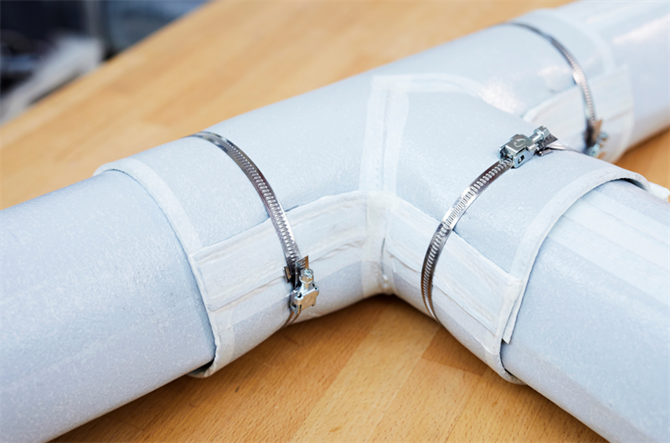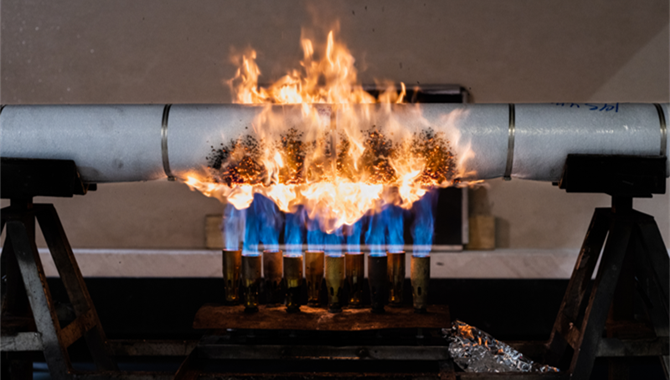HEAT-FIT is designed to bring lightweight, corrosion-free, and efficient thermoplastic piping systems to essential applications onboard ships. Now, the fire-retardant pipe jacket system has been approved by no less than four of the leading certification societies in the maritime sector, DNV, Bureau Veritas, ABS and Lloyds Register. As a result, GF Piping Systems offers complete solutions that can be implemented throughout the entire ship and make the maritime industry more sustainable.
The greenhouse gas (GHG) strategy by the International Maritime Organization (IMO) is very clear: Compared to 2008, the carbon intensity of international shipping must be reduced by 40% by the year 2030 and 50% by 2050. In an effort to meet these goals, shipbuilders and owners are increasingly looking towards thermoplastic piping systems as a solution – their low weight and resistance to corrosion make them a long-lasting and more cost-effective alternative to metal piping systems. However, especially high safety standards in L3 applications onboard, including engine cooling, ballast or ballast water treatment, have meant that thermoplastics could not be implemented throughout the entire ship. Thanks to the DNV, BV, ABS, and LR approvals, HEAT-FIT now introduces thermoplastic piping systems into L3 applications on cruise ships, merchant vessels, and offshore energy platforms.

An innovative fire-retardant pipe jacket system
HEAT-FIT by GF Piping Systems is compatible with the ecoFIT range of polyethylene pipes and fittings designed for fresh and sea water applications, as well as water and wastewater treatment. The new pipe jacket system is made of two TPU layers with a scratch and stain resistant outer finish. Between these TPU layers, HEAT-FIT encloses a high-temperature fiberglass fabric as well as an intumescent coating. Together, these proven materials protect the ecoFIT pipes and fittings against fire with a temperature of up to 1000°C for 30 minutes at a pressure of 3 bar. At the same time, HEAT-FIT is only 3,5 millimeters thick so it can be quickly and easily installed in new builds or retrofitted on existing ships without having to modify the piping system.
During its development phase, HEAT-FIT was subjected to a wide range of tests in order to ensure a safe and reliable operation. These included fire resistance of the pipe sleeves and accessories like pipe hangers and flanges in accordance with IMO Res. A753 fire endurance L3 Code. HEAT-FIT also underwent surface flammability, smoke and toxicity testing in accordance with IMO A653 2010 FTP Code Part 5 and Part 2. Furthermore, the components were waterproof tested with seawater, diesel-fuel contaminated water, as well as salt water spray.
“We are very pleased to have received confirmation by DNV, Bureau Veritas, ABS, and Lloyds Register that HEAT-FIT has been cleared for maritime applications”, comments Roberto Chiesa, Head of Business Development Marine at GF Piping Systems. “By introducing a fire-retardant pipe jacket system we have opened the door for thermoplastics to be used in additional applications on ships and offshore energy platforms. Our complete solutions simplify the planning and installation process.” Currently, the company is awaiting further approvals by RINA.
Working towards a more sustainable maritime industry
Traditionally, many pipes onboard ships have been made of either steel or metal. The drawbacks of these materials are their high weight and susceptibility to corrosion. “Plastic pipes, on the other hand, are a win-win for the maritime industry”, Roberto Chiesa explains. “Due to their material properties they are not only cheaper to install and maintain, but also make ships more energy efficient.” To prove these claims, GF Piping Systems conducted a study in 2021 which compared the use of pre-insulated polyethylene pipes with a post-insulated steel system on a simulated 150.000 GT cruise ship. As part of an air conditioning cooled water system, COOL-FIT, the company’s plastic alternative, improved the fuel consumption, lowered emissions, and reduced costs. “After 30 years in the maritime industry, we are very aware that we need to protect our oceans and our climate moving forward. I believe that plastic piping systems as part of a holistic strategy can play an important role in achieving these goals”, Chiesa adds.
The opinions expressed herein are the author's and not necessarily those of The Xinde Marine News.
Please Contact Us at:
media@xindemarine.com



 Ningbo Containerized Freight Index Weekly Commentar
Ningbo Containerized Freight Index Weekly Commentar  Ningbo Containerized Freight Index Weekly Commentar
Ningbo Containerized Freight Index Weekly Commentar  Ningbo Containerized Freight Index Weekly Commentar
Ningbo Containerized Freight Index Weekly Commentar  BIMCO Shipping Number of the Week: Bulker newbuildi
BIMCO Shipping Number of the Week: Bulker newbuildi  Ningbo Containerized Freight Index Weekly Commentar
Ningbo Containerized Freight Index Weekly Commentar  Ningbo Containerized Freight Index Weekly Commentar
Ningbo Containerized Freight Index Weekly Commentar